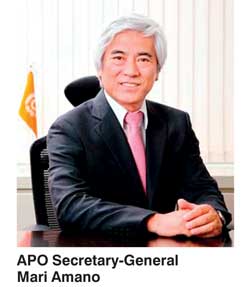Sunday Feb 22, 2026
Sunday Feb 22, 2026
Thursday, 15 September 2016 00:00 - - {{hitsCtrl.values.hits}}
Tokyo: The Asian Productivity Organization (APO) has released the Bangkok Outcome Document based on deliberations at the International Asia EnviroEconomics Conference. The document calls upon global economies to explore and adopt new business models to achieve GP and long-term business sustainability for a low-carbon future.
The conference was organised by the APO, along with the Thailand Productivity Institute and Federation of Thai Industries, as part of the Eco-Products International Fair 2016 in Bangkok from 8 to 10 June. It was attended by 18 international experts and local speakers with an audience of 193, including 34 international delegates representing 17 APO member countries.
Recognising existing resource limitations, the Bangkok Outcome Document identifies three key strategies and several steps for mitigating climate change. It also calls upon APO members and world economies to develop sustainable, smart, green communities and cities, and targets 50% reductions in water, waste, and carbon emissions per capita in cities by 2030.
The document recommends that this be achieved through recycling water and waste and doubling renewable and bioenergy use. It also suggests that by 2020 the world should double the number of eco-smart cities, reduce traffic congestion by 50% by increasing the volume and share of public transportation, and establish standards and criteria for eco-smart cities.
According to APO Secretary-General Mari Amano, “The Bangkok Outcome Document serves as a blueprint for future actions to ensure a low-carbon, sustainable future, building on progress already made through GP initiatives in the Asia-Pacific region and elsewhere.” He also called upon global economies, especially APO members to work together to implement the recommendations of the document and set an example for the rest of the world to follow.
The conference urged governments and decision makers around the world to recognise the need for a change in the present economic model and move away from the conventional short-term supply vision. It called upon policymakers to respect social and planetary limits to mitigate climate change impacts and work to achieve the UN Sustainable Development Goals and implement the Paris Climate Agreement.
The document emphasises the need for world economies to adopt multifunctional approaches to increase GP and calls for production chains that minimise emissions and waste by undertaking 100% recycling of biomass and other renewable energy sources. It also calls upon governments to provide plans and fiscal incentives for GP and ethical consumption at all levels.
Raising awareness of the need for sustainable development and GP at the social and business level is the third key strategy recommendation. The Bangkok Outcome Document recommends the use of mass media, social media, and education to do this and to create GP business models for climate change mitigation. The document also recognises the important role public policy can play in education, awareness, setting standards and criteria, and promoting renewable energy use, particularly in closing the gap between short-term economic priorities and long-term goals of sustainable development and mitigating the effects of climate change.